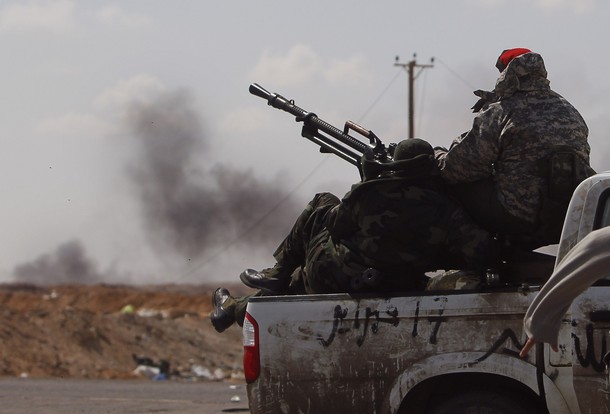
Continuing problems with the coalition operation in Libya reinforce an old military adage: You fight like you train.
Yesterday, we learned that Swedish jets were grounded because the air base didn’t stock the right type of fuel. Today, we learned Libyan rebels were painting their vehicles pink after yet another incident in which NATO mistakenly fired on them, mistaking them for Gadaffi forces.
At the headline level, at least, both stories were funny. But they both reveal what happens in coalition warfare when forces who have not previously trained together are suddenly fighting on the same team.
In the case of the rebels, it’s completely understandable. Not only was the notion of NATO fighting alongside Libyan rebel forces completely off the radar screen a month ago, as C.J. Chivers points out for the NYT, there isn’t really a rebel army to speak of.
What is visible in battle here is less an organized force than the martial manifestation of a popular uprising.
With throaty cries and weapons they have looted and scrounged, the rebels gather along Libya’s main coastal highway each day, ready to fight. Many of them are brave, even extraordinarily so. Some of them are selfless, swept along by a sense of common purpose and brotherhood that accompanies their revolution.
“Freedom!” they shout, as they pair a yearning to unseat Col. Muammar el-Qaddafi with appeals for divine help. “God is great!”
But by almost all measures by which a military might be assessed, they are a hapless bunch. They have almost no communication equipment. There is no visible officer or noncommissioned officer corps. Their weapons are a mishmash of hastily acquired arms, which few of them know how to use.
With only weeks of fighting experience, they lack an understanding of the fundamentals of offensive and defensive combat, or how to organize fire support. They fire recklessly and sometimes accidentally. Most of them have yet to learn how to hold seized ground, or to protect themselves from their battlefield’s persistent rocket and mortar fire, which might be done by simply digging in.
Prone to panic, they often answer to little more than their mood, which changes in a flash. When their morale spikes upward, their attacks tend to be painfully and bloodily frontal — little more than racing columns down the highway, through a gantlet of the Qaddafi forces’ rocket and mortar fire, face forward into the loyalists’ machine guns.
Certainly, then, NATO can be forgiven for not having trained to fight with a non-existent army for a war it couldn’t reasonably have foreseen in an area outside of its traditional sphere of influence. (It’s worth noting, too, that we had similar issues in the early going fighting with much more sophisticated partners during the 1991 Gulf War. Eventually, we all painted giant black V’s on the roofs and door panels of our vehicles.)
The Swedish case is far more baffling.
True, Sweden is not technically a member of NATO. As a historically neutral state, it has eschewed formal alliances. But it has maintained a fully modern military force and long maintained a friendly working relationship with Alliance countries. Further, it has been a member of the Partnership for Peace since 1994 and participated in all of NATO’s major post-Cold War missions, including peacekeeping in Bosnia and Herzegovina, contributing a mechanized infantry company and support units in Kosovo, and serving as part of the ISAF force in Afghanistan, where it leads the Mazar-e-Sharif Provincial Reconstruction Team.
Indeed, a major reason Sweden joined PfP was to foster interoperability with NATO forces. Which it has done, in addition to the deployments noted above, through participation in a variety of training exercises such as the recurring Loyal Arrow. And, as my colleague Magnus Nordenmann noted months back, the "Solidarity Declaration" has Sweden developing a greater regional defense role.
Interestingly, the same aircraft that was unable to participate yesterday because of fuel problems, the JAS-39 Gripen fighter jet, routinely operates with NATO forces in these exercises.
Then again, more planning almost certainly goes into putting on the Loyal Arrow exercise than went into this war. The lead time, after all was exceedingly short.
James Joyner is managing editor of the Atlantic Council. Photo credit: Getty Images.
Image: libya-truck-fighters.jpg
